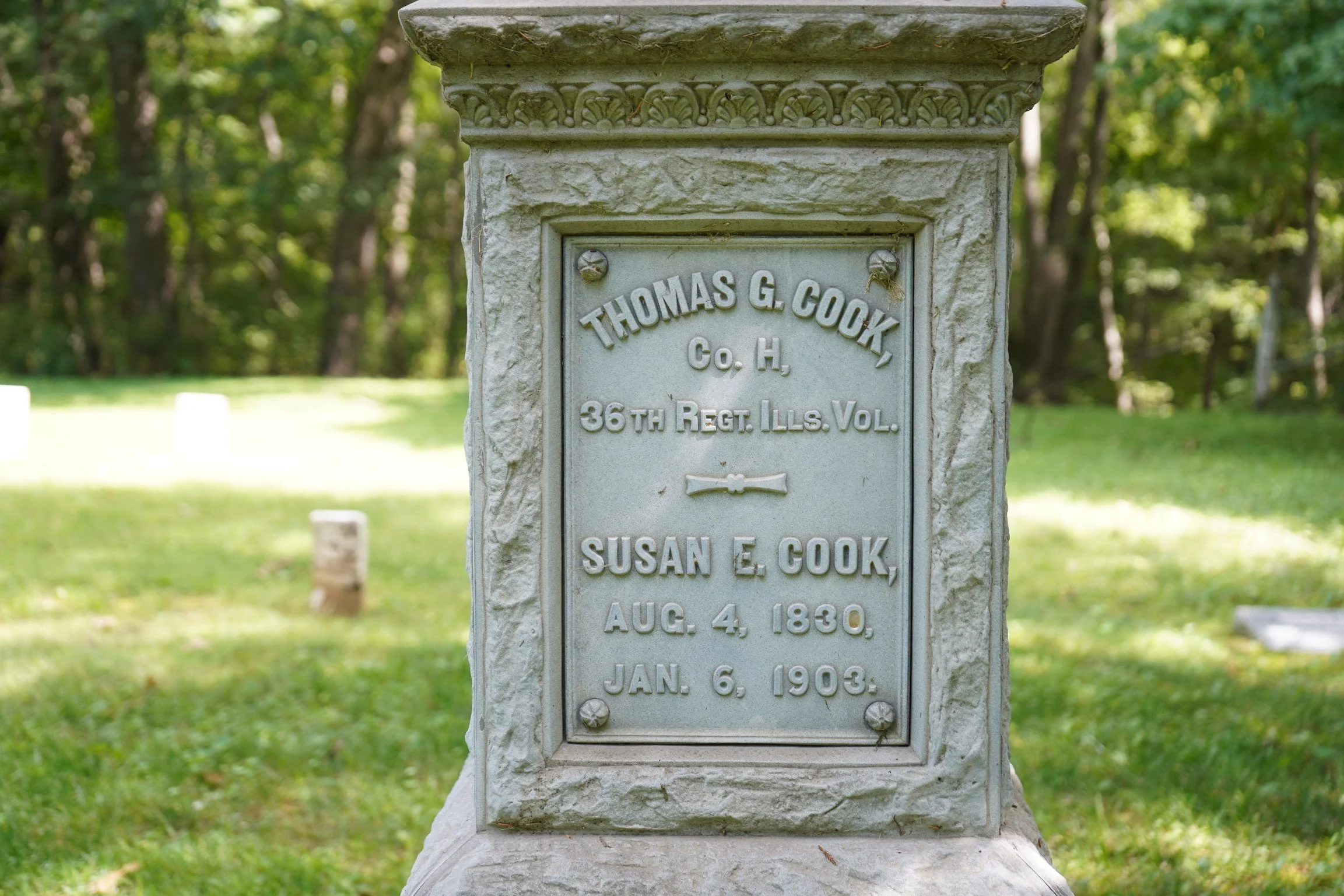Thomas Giles Cook: A Soldier’s Letters of Love and Reluctance
By: Hannah Chatterton
A family photo on the farm south of Victoria. Thomas Giles Cook is the haggard fellow on the far left.
"This is not the kind of war hero I was expecting to find in the family," says John Feltham as he holds copies of letters written by his great-great-grandfather, Thomas Giles Cook, during the Civil War. In these letters, Cook is not the eager patriot that one might expect. Instead, he is a reluctant soldier, drafted in 1864 at the age of 40, doing everything he can to avoid service. As the 160th anniversary of his enlistment approaches, Cook's letters offer a glimpse into the life of an ordinary man who longed to stay with his family, far from the horrors of war.
Thomas Giles Cook was born in 1824 in Orleans, Vermont, and came to Nauvoo, Illinois, with the Mormon migration. After Joseph Smith's murder, his father, Giles Cook, moved the family to Knox County. Thomas married Susan Wilder in 1848, and they acquired a 212-acre farm south of Victoria. They had seven children together and lived a quiet life on their farm in Knox County until September 27, 1864, when Cook was drafted and mustered into Company H of the 36th Illinois Volunteer Infantry. At 40, Cook was older than most soldiers and desperate to avoid leaving his family. From the very beginning, he sought a substitute to take his place, a legal option for drafted men at the time. In his first letter to Susan, dated October 15, 1864, he expressed hope that he would be deemed unfit to serve. If I "am pronounced fit to go [to war], I shall send home for a substitute," he wrote. Cook was forced to join his regiment despite his efforts, and no substitute was found.
Months later, on December 27, an unknown family member wrote to Cook explaining that they had found a neighbor boy willing to take Cook's place for "five hundred Dollars and that stack of Hay that's beside the road on Betsey's place & we pay for his passage down there." A massive price to pay, Cook refused the exchange, saying he felt he had "passed through the hardest of it now."
Cook's letters reveal his deep love for his family. He frequently signed his letters with affectionate phrases such as, "believe me ever yours let what will happen," or "Kiss baby for me as many times as you can. And believe me yours for ever and ever." His letters often included tender messages to his wife and children, trying to maintain a sense of normalcy even as war loomed large.
The 36th Illinois participated in the pursuit of Confederate General John B. Hood which led to the battles of Franklin and Nashville, and was almost continuously under fire while marching from Spring Hill to Franklin. At Franklin, the 36th was engaged in the heaviest part of the fighting, and its commanding officer was killed. Cook was initially shipped south to Chattanooga, and he and his fellow draftees eventually caught up with the regiment at Pulaski, Tennessee. He was medically evacuated from Columbia, Tennessee, to a hospital in Nashville, enabling him to avoid the engagements at Spring Hill and Franklin and possibly saving his life. Although his time in service was brief, he was not shielded from the harsh culture of war.
In a letter written on November 11, 1864, from Nashville (presumably en route to join his regiment), Cook described a two-day march without food, relying solely on "hard tack" while others spent their meager savings to buy a few boiled eggs. His letters show bitterness toward the war and the toll it took on him both physically and emotionally. On November 28, 1864, two days before the battle of Franklin, Cook wrote home from Hospital 15 in Nashville, describing how his unit had marched over 30 miles to Columbia, Tennessee. Though his company was not directly involved in the fighting, they built breastworks and heard the sounds of battle nearby (possibly engagements related to the army's crossing of the Duck River. "[T]he Rebbs (Rebels) lost 4,000 killed and wounded in two charges," he wrote, though he did not yet know how many men the Union had lost.
Throughout his service, Cook suffered from chronic rheumatism, a condition that would eventually lead to his discharge. In one letter, Cook mentioned that his health had been declining ever since an accident in Brimfield, Illinois, five years earlier. The constant marches and poor living conditions only worsened his state. By December 1864, he was hospitalized again, this time diagnosed with nephritis and rheumatism: "My hipps and legs pain me nearly all the time and my back." The persistent pain and confinement to a hospital bed, saying "it would suit some people to lay round a Hospital but it dont me," spurred him to appeal to the surgeon to recommend him to the Board for discharge. Affidavits were requested from friends and his doctor who had treated him back home for nearly twenty-five years, and his discharge was set into motion.
Cook's humor often emerged in his letters, serving as a way to cope with his difficult circumstances. In a letter dated December 19, 1864, from Jefferson Barracks in Missouri, Cook wrote about his longing to be home for Christmas, and despite the cold and homesickness, he signed off with a bit of irony: "If I could be there now, it would be very consoling to sit by the stove and read the papers and help you eat a chicken Christmas day, well enough for this time. I have just been to diner. Bread fresh meat and soup. Bread butter and Tea for supper last night. Plenty to eat. good bed. good fire. good room. Who wouldent be a soldier."
A modern photo of the farm where T.G. Cook's photo was taken.
As the winter of 1864 turned into 1865, Cook's health continued to deteriorate. In a January 6 letter, he described the agony of marching while in pain, collapsing on the ground whenever his unit stopped to give his body brief respite from the constant torment. By this point, Cook had had enough of the war. "I thought when I was drafted it was my duty to go or send a better man in my place. Well, I tried it now I'm satisfied, and God being my helper I will never try it again." He made it clear that he wanted out of the war, "I know now it is my duty to get out of it now if I can and not pay five hundred Dollars either. we know Uncle Sam dont want criples to fight for him he has enough sound men to do that if not he better quite the job"
Cook's wish was granted on January 17, 1865, when he was discharged from service due to his chronic rheumatism. His discharge papers noted that he had been unfit for duty for sixty days and that his condition left him barely able to walk. He was sent home just months before the Civil War ended in April 1865.
Cook's return to civilian life was marked by ongoing struggles with his health. John Feltham believes that his great-great-grandfather may have received a pension for the accident that occurred before the war, under the guise of war injuries. Nevertheless, he lived to the age of 85, passing away in Galesburg, Illinois, in 1909.
For Feltham, the letters offer a unique glimpse into the life of a man who was caught up in one of the most defining conflicts in American history, yet never wanted to be a part of it. Although Cook survived the war, some of the men drafted into the 36th Illinois Infantry with him did not. Feltham, a retired Marine Corps colonel, shared that in barely 12 weeks from the date his unit was inducted, they found themselves under fire, participated in multiple combat actions, and fought in two major battles. Marine Corps recruit training currently lasts 13 weeks, and is then followed by specialized infantry training. Conversely, the men drafted with Cook may well have been sent into battle with little, if any, formal training.
To echo Feltham's words again: "This is not the kind of war hero I was expecting to find." But perhaps Cook's legacy lies not in acts of battlefield bravery, but in his humanity—the simple desire to return to his wife and children, to sit by the stove during Christmas, and to help them through the hard times.
In many ways, Cook's story reflects the personal toll of war, especially for those who never sought it. His letters, filled with humor, love, and frustration, offer a window into the heart of a reluctant soldier who simply wanted to go home. As we mark the 160th anniversary of his service, his words remind current readers that not all heroes fit the mold of the brave warrior. Some, like Thomas Giles Cook, were just fathers and husbands and farmers trying to find their way back to their families.
T. G. Cook's headstone in West Truro cemetery, Knox County IL



